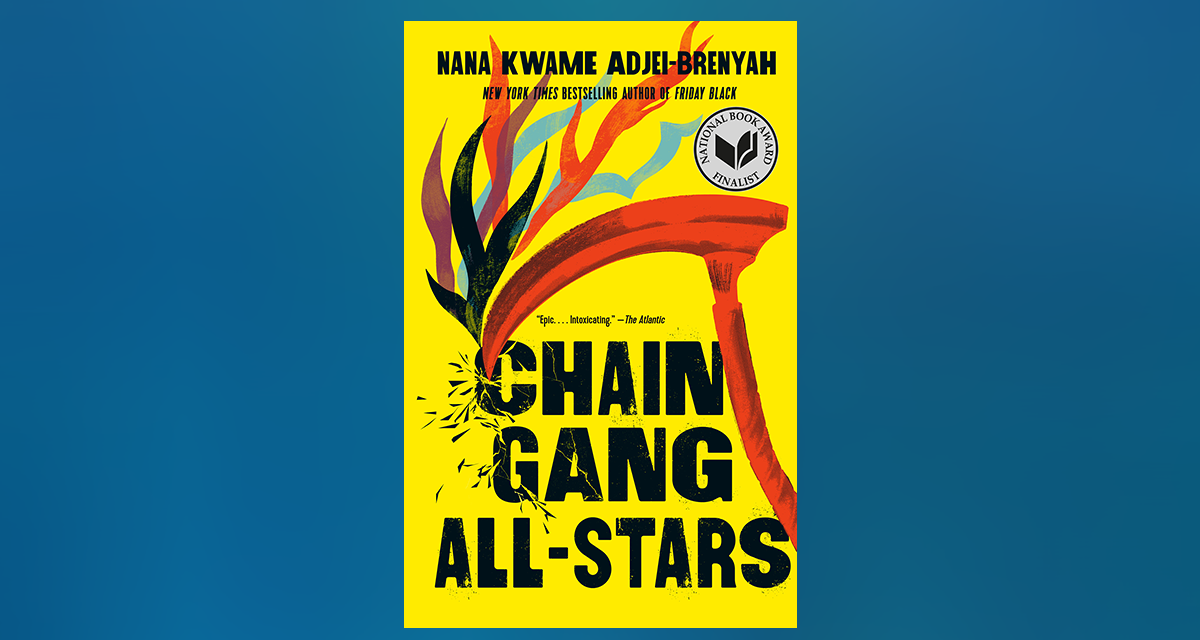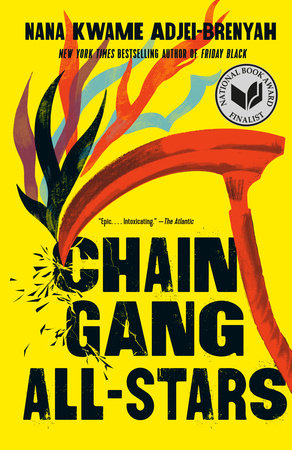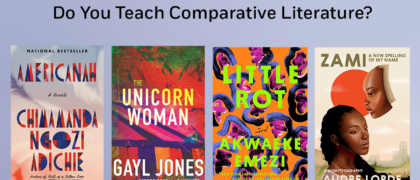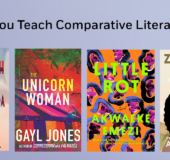Longlisted for the Andrew Carnegie Medal for Excellence
In Chain Gang All Stars, two top women gladiators fight for their freedom within a depraved private prison system not so far-removed from America’s own.
The Freeing of Melancholia Bishop
She felt their eyes, all those executioners.
“Welcome, young lady,” said Micky Wright, the premier announcer for Chain- Gang All- Stars, the crown jewel in the Criminal Action Penal Entertainment program. “Why don’t you tell us your name?” His high boots were planted in the turf of the BattleGround, which was long and green, stroked with cocaine- white hash marks, like a divergent football field. It was Super Bowl weekend, a fact that Wright was contractually obligated to mention between every match that evening.
“You know my name.”
She noticed her own steadiness and felt a dim love for herself. Strange. She’d counted herself wretched for so long. But the crowd seemed to appreciate her boldness. They cheered, though their support was edged with a brutal irony. They looked down on this Black woman, dressed in the gray jumpsuit of the incarcerated. She was tall and strong, and they looked down on her and the tight coils of black hair on her head. They looked down gleefully. She was about to die. They believed this the way they believed in the sun and moon and the air they breathed.
“Feisty,” Wright said with a grin. “Maybe that’s what we should call you—Little Miss Feisty.”
“My name is Loretta Thurwar,” she said. She looked at the people all around her. There were so many of them, so many waves of humans who would never be the object of such cruel attention. Would never know how it made you feel, both tiny and all- powerful. How the thrum of thousands was so loud, so constant, it could disappear from your ears but continue to roar as something felt in the body. Thurwar gripped the weapon she’d been given: a thin spiraling corkscrew with a cherrywood handle. It was light and simple and weak.
“Not Little Miss Feisty, then?” Wright said, walking a wide orbit around her.
“No.”
“That’s probably for the best, Loretta.” He stepped toward his box. “I hate wasting good names anyway.” He laughed and the crowd echoed him. “Well, Loretta Thurwar”—he threw his playful condescension directly at her, chopping her first name into three hard syllables, using a singsong child’s voice for her last—“welcome to the BattleGround, baby.”
There was an electric cough in the air and Thurwar was pulled down so forcefully she feared for a moment her arm had been dislocated at the shoulder. Kneeling, not knowing what else to do, she started to laugh. Chuckling first, then deep laughter. The feeling of hold that came from the magnetic implants in her arms was actually one of gentle massage under the skin. She could wiggle her fingers freely, but her wrists were glued to the platform. The ridiculousness of it all. She laughed until she felt out of breath, then laughed some more. The bells began to sound.
Wright screamed into the air, “Please rise for Her Majesty!” He ran the rest of the way to his announcer’s box.
The crowd stood on their feet. They held themselves still and erect. For her.
She walked onto the faux football field. Aluminum alloy on her arms. Braids that stopped at the back of her neck. Exposed shoulders each tattooed with the WholeMarket™ logo. A series of rods jutted out from her chest guard and circled her muscled abdomen to form a sleek cage. It was a custom creation. Thurwar had watched, even cheered, the first time she’d seen that the metallic pieces, initially thought to be exclusively defensive, were more. She’d been watching, huddled with the others in her cell block around the streaming video feed, when the woman had removed two of the rods from her guard and pressed them into Slingshot Bob’s eyes.
And now Thurwar was seeing them up close. This was Melancholia Bishop’s final fight. Bishop had made it. She had done what no woman before her had done, survived three years on the Circuit. Three years of slamming down her hammer, Hass Omaha, and swiping her mace, Vega. Three years conquering souls.
“Drowned King County’s very own Queen of the Damned!”
All she had in her hands was her helmet. Melody’s Helm. Crusaderstyle, made of tin with a gold cross down its middle.
“The Annihilator, the Bad News Bitch, the Death Songstress herself!”
The seventh bell rang; the people screamed. For years this had been their sacred ritual. The seven bells of Melancholia Bishop. They’d seen her wipe scum o_ the earth. They’d seen her kill women and men whom they’d once claimed to love. Now she stood and looked out at them for the last time. Soon, she would be free.
Melancholia
Melancholia
MelancholiaThe crowd chanted. Her brown eyes explored the bleachers. Then she raised the helm above her head. Once it was on, she was home.
Melancholia
Melancholia
Melancholia“For the last time ever,” Wright cheered, “please help me welcome the winningest woman ever to step on the BattleGround. The Mistress of the Murder Ballad. The Sacred Sweetheart. The Crusader. The baddest the planet has ever seen. Your very own Melody ‘Melancholia Bishop’ Price!”
Your very own, Thurwar thought, rattled by the force of the love that exploded out from the audience. They loved her so, and still, this woman, despite it all, belonged to none of them. She had an aura about her that made that clear. It was enough to push Thurwar’s eyes down to the ground. As if the woman in front of her truly were royalty.
Thurwar watched, bowed in her Keep, an impossible power in front of her. The hammer and the mace. On one side of the field there was a knight in her armor. On the other, there was Thurwar in a jumpsuit, a corkscrew slick in her clammy hands.
Bishop!
Bishop!“Any final words for us, Melancholia?” Wright asked.
“What’s left to say?” she said, her voice echoing metallic but familiar through her helmet as she addressed the crowd. “I’m in the same place I started.”
The crowd cheered wildly.
“When I got here, I had two Ms on my back. Two murders. When I leave, I’ll still just have two. But I had to kill so many more people than that to get here.”
“That’s very true. You’ve cleaved through so many,” Wright said. “But any of those stand out to you? So many highlights. And you’ve overcome more than your fair share of doubt. Here on the mountaintop, when you look back down, what are you proudest of?”
“Proud?” A metal face turned toward the sky. Her shoulders bounced and she laughed. The crowd followed awkwardly. Chuckling because this was their queen. As the crowd grew raucous with laughter, Melancholia fell silent. Then was a moment when the crowd seemed not to know what to do next.
“Lock-in!” Wright yelled. Again, a force sounded, this time locking Melancholia Bishop into the platform beneath her. The HMC* that she’d been speaking into flew up and behind her. The crowd let out a small gasp. To force- lock her, to silence her, on her freeing day. It was beneath them. A sudden force- lock was what you gave the despicable, the uninitiated, the unruly, the afraid. And so they turned their noses up at it, but turned them back down just as quickly to take in the history unfolding before them: the freeing of Melancholia Bishop.
“Let’s deathmatch!” Wright yelled.
The loud, empty sound of unlock called through the arena. The women were released upon each other.
Thurwar stood up and she ran, ran directly at the unbreakable woman in front of her. Once she was close enough for it to matter, she leapt in the air and pulled back her fist, clenched around the corkscrew, and aimed to strike. She screamed, thrust down. The neck, the neck. Her body said the neck.
Melancholia snatched her by the wrist, dissolving her force to nothing, then punched her in the gut.
Melancholia
The people screamed to the beat of bass drums. Again and again, they’d seen her “catch and crash,” had seen her drop Hass Omaha or Vega and grab her opponent with one hand before using whichever weapon she still held in the other to deal a death blow. But now she held this nothing by the wrist and threw a bare- knuckled punch. A blow anyone could survive. She was playing with her food. They laughed and cheered and cried. A show-woman to the end.
“Swing through, not at,” Melancholia said. This the people could not know. In her helm, with no HMCs buzzing around—they might distract or affect the fight—the two women on the BattleGround were alone with their words.
Melancholia punched Thurwar again and threw her down to the grass.
Thurwar knew she’d been spared. She didn’t know why. She swallowed the death she’d seen in the moment Bishop had held her. She looked up at the heroic, terrible woman standing above her.
“Can you hear me?” Melancholia asked.
Thurwar scrambled through the field, panting hard, sweeping over the green. She’d lost the corkscrew. She hated herself, an intense, familiar feeling. She was crying. She pitied the sad thing she’d become in that moment, hunched and searching. Frantic and soon dead. But her murderer was speaking to her. “Listen to me,” she said. Then Thurwar felt a kick to the ribs. She rolled over in the grass, gasped air in, and scrambled to her feet again.
She gathered herself and looked at the Crusader. Thurwar wanted to win. She wanted it desperately. She had a furious desire to crush this woman in front of her. She wanted the crowd to weep. For the first time in so long, she wanted to live.
With no weapon at hand Thurwar ran at Melancholia. Before she could leap, she saw that both the hammer and mace were on the ground. The titan was making a game of her life. She sprinted and tackled the woman with the urgency of the dying. They tumbled together briefly, their bodies rushing over white hash marks. Then Thurwar felt a tightness at her scalp. She reached up in the tussle and felt a blow to the chest. She was dragged by her hair to her knees.
“Shave all of it,” Melancholia said, her fist full of Thurwar’s hair. This time Thurwar heard her, understood that she was being given a directive.
“Shave off your hair,” Bishop repeated, her voice hard and low. She punched Thurwar in the face again. Thurwar tasted blood falling from her nose to her lips. Again she was thrown to the ground.
“It’s right in front of you,” Thurwar heard. “Choose now.” Melancholia raised her arms in victory. The whole world screamed.
Thurwar saw it, the coil of metal stuck into the wood. She leapt at it like a snake and in her rush to grab it, she cut her own middle finger deeply. She ignored the blood, rose to her feet, and as she did, Melancholia Bishop turned to her, then reached down and grabbed the hammer.
Thurwar took long, careful steps as she moved in a wide perimeter around Melancholia. The noise had settled to an even roar, but the sound was just an echo now, as was the pain in her body.
“I played their game. You don’t play it.”
“I’m not dying here,” Thurwar said. A long-smothered part of her emerged.
“Then swing through, not at.” Thurwar watched Bishop. “I am very tired,” the other woman said. “Do you understand?”
“I’m not dying here,” Thurwar repeated, the words summoning themselves. She continued to circle Bishop, backing farther away, gathering space to charge. Bishop followed her in a smooth pivot.
“Then swing through, not at. And shave your fucking head. And make them love a version of you. That’s the important part, whatever you do. Love, then get out.”
Thurwar waited. Corkscrew clenched in fist.
Bishop’s knees bent just enough for her stance to say, Come at me. She looked at Thurwar and spoke. “I’m not going to let you live. You are going to choose to live. I’m going to swing across my body. Once the hammer goes I can’t stop it. Understand?”
Thurwar did and she didn’t. She couldn’t. Not then. Bishop reached for her helmet and pulled it off. Even against her dark skin the scars on her neck gleamed. Her black hair was in tight cornrows. Melancholia raised her arms and the crowd screamed anew in delight. Thurwar glanced up at the Jumbotron. It occurred to her then that this god was a woman like her.
Melancholia Bishop smiled briefly once more before her face became hard and murderous.
Thurwar stepped forward toward her destiny. Her left arm pumped into the air. Her hand was cupped loosely, and she shot her right leg up, planting it as hard as she could. She pushed forward, fully immersed in the freedom of building momentum. Her eyes were trained on Bishop’s neck, as supple and human as anyone’s. Her left arm careened back, scooping the air and hurtling it behind her as her left leg jutted up, her knee pulled forward, and her stride grew. She ran.
Mel—
Her left foot fell first, the midsole landed, and she rolled purposefully to her toes before pushing off again. Her body remembered, would always remember, how to run with purpose.
—an—
Again, her arms reversed themselves, slipping precisely past each other as her right leg rose and fell, her stride opening still. She was very close. She thought of nothing, put her trust in her body as it sped forward.
—cholia
Her arms switchbladed and her legs carried. She continued the push and switch of her arms and legs, forging speed. Her body told her, This speed, me, your body is your weapon.
When she was two paces away Melancholia’s arm swung backward, a negative motion, a buildup. She pulled the hammer back, the picture of destructive potential.
Thurwar’s foot came down again. Melancholia came forward, pushing first, then letting the hammer pull her. It swung across the air in a murder song. Thurwar dove toward the ground, tucked in her head and neck, and rolled as the hammer sowed fresh death into nothing. She crouched and then leapt, her right, corkscrewed fist leading. She screamed as she ripped open Melancholia’s jaw.
The silence bore something new in Thurwar. Her body tingled as red fell into her fist. A spattering of blood burst from Melancholia’s lips. The hammer rose briefly and crushed down, just grazing Thurwar’s shoulder as she twisted out of its murderous path. Thurwar jumped onto Melancholia’s back. She wrapped her legs around Bishop’s waist and stabbed hard into the side of Bishop’s neck, then pulled the corkscrew out and punched in again. This time as she tried to pull it out, the screw resisted, caught in the tangle of Bishop’s flesh. Thurwar pulled harder, and when she did, the handle came out alone, the metal screw lost somewhere in Bishop’s throat. With nothing with which to pierce, Thurwar punched Melancholia’s head. She’d given three heavy blows before she felt the champion’s knees buckle.
Bishop swatted weakly behind her at Thurwar, as if at a pesky fly. Her hammer was on the ground. Thurwar drank the sweet, rich silence of absolute awe.
She screamed a roar, and in that moment she was the only sound. She jumped from the woman’s back and Melancholia stood sleepily, somehow, still. Seeing the woman on her feet, Thurwar scrambled to grab the hammer. Her fingers found the grip and Melancholia looked down at her. Suddenly afraid, Thurwar jumped back. Bishop swayed, holding her neck, then letting it go. Her eyes were brown, beautiful, tired, and yet they widened for a moment as she looked at Thurwar, her killer.
Come at me, those eyes said.
Thurwar obeyed. She ran. She brought the hammer like a bomb to the face of its first master, and the people, those people, were silent no more.
Copyright © 2023 by Nana Kwame Adjei-Brenyah. All rights reserved. No part of this excerpt may be reproduced or reprinted without permission in writing from the publisher.

© Alex M. Philip
NANA KWAME ADJEI-BRENYAH is the New York Times-bestselling author of Friday Black. His work has appeared in The New York Times Book Review, Esquire, The Paris Review, and elsewhere. He was a National Book Foundation’s “5 Under 35” honoree, the winner of the PEN/Jean Stein Book Award and the Saroyan Prize, and a finalist for the National Book Critics Circle’s John Leonard Award for Best First Book, along with many other honors. Raised in Spring Valley, New York, he now lives in the Bronx.






